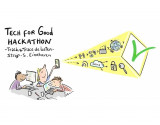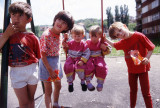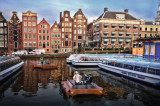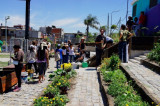Responsible data sharing

If data is the new gold, how can we ensure that we can all benefit from the possibilities? The Amsterdam Data Exchange (in short: Amdex), an initiative of Science Park Amsterdam and the Amsterdam Economic Board, could be the answer to this.
The project, as described in a report published this week, aims to provide broad access to data for researchers, companies and private individuals. Inspired by the Open Science Cloud of the European Commission, the project is intended to connect with similar projects across Europe. And eventually even become part of a global movement to share data more easily. (attachments in Dutch)
Share data trustfully
If data is the new gold, how can we ensure that we can all benefit from the possibilities? The Amsterdam Data Exchange (in short: Amdex), an initiative of Science Park Amsterdam and the Amsterdam Economic Board, could be the answer to this. The project aims to provide broad access to data for researchers, companies and private individuals. Inspired by the Open Science Cloud of the European Commission, the project intends to connect with similar projects across Europe and eventually become part of a global movement to share data more easily.
The idea originated during the Science and Business dinner organized by Amsterdam Science Park (ASP). With Science Park’s history in the field of technological innovation and digital connectivity, the Amdex was a logical next step. As argued by Margo Keizer (ASP), "data sharing is already happening here, but at an informal level. We bring all these different initiatives together. To do this, we need to address various infrastructural and legal issues." The Amsterdam Data Exchange is an initiative to do exactly that, she adds.
Transparent and familiar
Wouter Los questions: "how can we work efficiently with all this data?” With his extensive experience in the European scientific community, Los helped in the investigation of the function of the data marketplace. He explains "we want to go to an open, democratic playing field. In this model - in contrast to the monopolistic models that you now come across - the data remains from its owner and they decide which data can be shared with whom and under what conditions. We build a market model in which everyone is able to consult and use data in a transparent, familiar manner."
Chief Technology Officer, Ger Baron mentions, "since 2011, the municipality have had an open data policy. Municipal data is from the community and must therefore be available to everyone, unless privacy is at stake. In recent years we have learned to open up data in different ways.” He adds, “panorama photos, for example, are freely accessible on our data portal. In addition, we share data with market parties to find a parking space. We want to share data, but under the right conditions. This requires a transparent date market which is exactly what the Amsterdam Data Exchange can offer. "
After the publication of this report, in which a vision on the open data market is outlined, the design will be made more concrete using usecases.
As Willem Koeman (Amsterdam Economic Board) agrees, "sharing data is the key to solving our 21st century challenges. And with the Amsterdam Data Exchange, Amsterdam is leading the way.”
(Article and report in Dutch)
Read here briefly what AMdeX stands for
Read the extensive AMdEX report here
-----------------------------------------------------------
Vertrouwd data delen
Als data het nieuwe goud zijn, hoe kunnen we er dan voor zorgen dat we allemaal kunnen profiteren van de mogelijkheden? De Amsterdam Data Exchange (kortweg: Amdex), een initiatief van Science Park Amsterdam en de Amsterdam Economic Board, zou hierop het antwoord kunnen zijn. Het project, zoals beschreven in een rapport dat vandaag wordt uitgebracht, heeft tot doel brede toegang tot data te bieden voor onderzoekers, bedrijven en particulieren. Geïnspireerd door de Open Science Cloud van de Europese Commissie, is het project bedoeld om verbinding te maken met soortgelijke projecten in heel Europa. En uiteindelijk zelfs onderdeel te worden van een wereldwijde beweging om data makkelijker te delen.
Het idee is ontstaan tijdens het Science and Business diner georganiseerd door het Amsterdam Science Park (ASP). Met de geschiedenis van het Science Park op het gebied van technologische innovatie en digitale connectiviteit, was de Amdex een logische stap. “Het delen van gegevens gebeurt hier al veel, maar op informeel niveau,” legt Margo Keizer van het ASP uit. “We brengen al die verschillende initiatieven bij elkaar. Om dit te doen, moeten we diverse infrastructurele en juridische kwesties aanpakken.” De Amsterdam Data Exchange is een initiatief om precies dat te doen, voegt ze eraan toe.
Transparant en vertrouwd
“De vraag is, hoe kunnen we efficiënt werken met al deze gegevens?”, zegt Wouter Los, die met zijn uitgebreide ervaring in de Europese wetenschappelijke gemeenschap heeft geholpen om de functie van de data marktplaats te onderzoeken. “We willen naar een open, democratische speelveld toe” legt hij uit. “In dit model – in tegenstelling tot de monopolistische modellen die je nu tegenkomt – blijven gegevens van de eigenaren en beslissen zij zelf welke gegevens kunnen worden gedeeld met wie en onder welke voorwaarden. We bouwen een marktmodel waarin iedereen in staat is om gegevens te raadplegen en te gebruiken op een transparante, vertrouwde wijze.”
“Als gemeente hebben we sinds 2011 een open data beleid. Gemeentelijke data is van de gemeenschap en moet dus voor iedereen beschikbaar zijn, tenzij de privacy in het geding is”, zegt Ger Baron, Chief Technology Officer van de gemeente Amsterdam. “De afgelopen jaren hebben we geleerd om data op verschillende manieren open te maken. Panoramafoto’s bijvoorbeeld zijn vrij toegankelijk op ons dataportaal. Daarnaast delen we data met marktpartijen om bijvoorbeeld een parkeerplek te vinden. Wij willen data graag delen, maar wel volgens de juiste voorwaarden. Dit vereist een markt voor data met transparante regels. Dat is precies wat de Amsterdam Data Exchange kan bieden.”
Na de publicatie van dit rapport, waarin een visie op de open data markt wordt geschetst, zal het ontwerp verder worden geconcretiseerd aan de hand van usecases.
“Het delen van data is de sleutel tot het oplossen van onze 21e eeuwse uitdagingen. “En met de Amsterdam Data Exchange loopt Amsterdam hierin voorop”, zegt Willem Koeman van de Amsterdam Economic Board.
Wil je meer weten? Op 15 mei organiseert de Amsterdam Economic Board een bijeenkomst over de Amsterdam Data Exchange, stuur een mailtje naar Willem Koeman (w.koeman@amecboard.com) om op de hoogte gehouden te worden.





